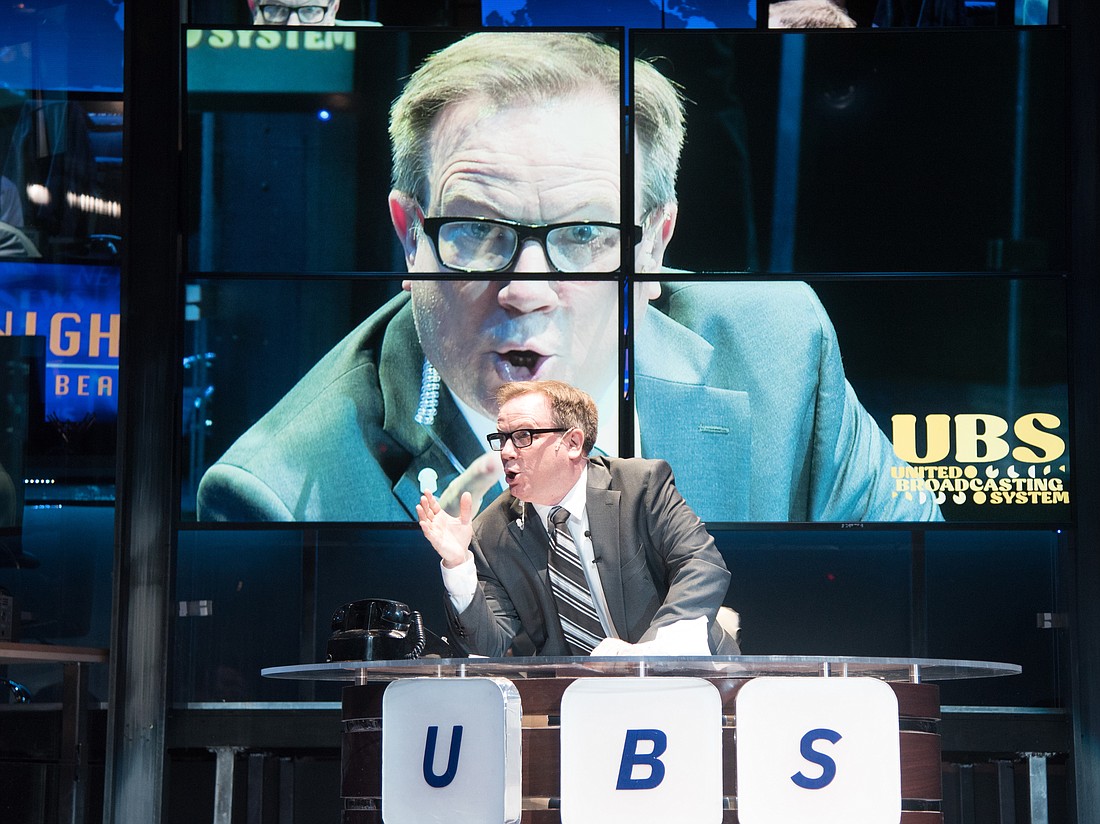- July 26, 2024
-
-
Loading

Loading

Paddy Chayefsky was a fearless, funny, brilliant playwright, screenwriter and novelist.
Back in the 1950s’ “Golden Age” of television, he wrote several award-winning teleplays. After that, Chayefsky saw TV devolve into a medium for morons. Chayefsky changed channels — and became a screenwriter. In 1975, he wrote a screenplay called “Network.” And took a cinematic poke at the boob tube’s unblinking cyclopean eye.
Director Sydney Lumet’s movie hit the cinema screen in 1976. Peter Hall adapted it as a stage play in 2017. Today, Chayefsky’s satiric barbs are still as sharp as ever. For proof, tune into the current FST production.
Stage or screen, the story of “Network” remains the same.
CBS, NBC and ABC were America’s “big three” broadcasting networks in the 1970s. “Network” imagines a fourth — UBS. A nasty, multinational conglomerate called CCA has just gobbled it up. The new owners plan to gut the old network’s unprofitable news division. Prior to that, they fire Howard Beale (Sheffield Chastain), the UBS news anchor — a national father figure like Walter Cronkite. After Howard gets the pink slip, he gives the nation some bad news: He’s going to kill himself on live TV. The network pulls Howard off the air — permanently. But his old friend, Max (Rod Brogan) is still running the UBS news division. Howard wants a guest editorial? Max lets him have it. Howard’s first rant is merely profane. It’s merely a hit. His second diatribe is either lunacy or prophecy — but his ratings are stratospheric. To the network’s corporate overlords, that’s all that matters. So Howard stays on the air.
While Hall’s script keeps most of Chayefsky’s original dialogue, the story plays very differently on stage. Director Richard Hopkins makes the most of live theater’s possibilities.
Hopkins knows that this play (like any play) is inherently interactive. You’re watching a live show on stage, not a recorded images on a screen. With “Network,” the conceit is you’re part of the TV studio audience. A smarmy “Warm-Up Guy” works the crowd. The Warm-Up Guy orders them shout, “I’m mad as hell!” Signs flash “Applause!” The audience does as told. The director makes you feel the manipulative mob psychology. It works — and it’s creepy as hell.
Chastain neatly avoids the looming shadow of Peter Finch’s iconic film performance. He’s found a fresh take on Howard Beale — and a new voice, too. Though I hear echoes of Harlan Ellison, the late great sci-fi author and gadfly. Happy accident or imitation? (Check out Ellison’s “Pay the Writer” rant on YouTube and decide for yourself.)
Zien’s Diana is also a brave, new beast. Forget Faye Dunaway’s Nordic Ice Queen. Her character’s more earthy, more sensual — a Machiavellian sex bomb. She’s playing with the big boys, but she’s not a boy. (April Andrew Carsell’s sizzling costumes make that clear.) Her Diana’s just another network power player who happens to have XX chromosomes.
Sean Phillips’s Frank Hackett is a corporate hitman. The CCA suits use him to cut costs and ruin lives at UBS. He’s good at his job. Robert Duvall played the character as a raging hatchet man. Phillip’s Hackett is more of a coldly calculating sniper. He gets you in the crosshairs from a mile away. One bullet. One kill.
Out of all the main characters, Max is toughest to play. He’s not evil or insane, just normal. He’s the story’s designated regular guy — whom Diana symbolically seduces. Brogan, ducks around Chayefsky’s heavy-handed symbolism and plays Max (believably) as Howard’s loyal, flesh-and-blood friend.
“Network” is a story about television. It unfolds in Isabel and Moriah Curley-Clay’s convincing simulation of a working TV studio. Nathan Scheuer’s videos, Ben Rawson’s lighting and Thom Korp’s audio complete the illusion. Their collaboration is outstanding, despite a few opening night glitches.
Based on the news clips and commercials, their creation looks like a newsroom studio in 1975. But it’s an alternate reality. Instead of bulky TV cameras, they’ve got the latest digital tech. Hang on. High-res flat screens, compact vid cams, miniature mics, and recording gear in the disco era? Yeah, baby. I love it! And I happily suspend my disbelief. (But lose the dial phones. If you’re going to go high-tech, go all the way.)
This parallel world looks contemporary. You can easily connect the dots to our world. They had one big TV screen; we have lots of little screens. Their idiot box had one giant cult of personality. Our “smart” devices have a multitude.
This FST production is consistently great with flashes of genius. Kudos to all the talents involved. They had great material to work with, of course.
Hall’s stage adaptation is sharp. He didn’t try to tweak Chayefsky’s dialogue. He did cut a few hilarious scenes (like the Maoists bickering over syndication royalties) and tightened the narrative. Great run! But he stumbles at the finish.
Chayefsky’s screenplay ends with an iconic last line. Fifteen words of pure dynamite. Hall added 103 more words. He spells out the story’s moral — just in case you missed the point. But “Network” had already made its point! (Several, in fact.) The main point?
Here’s Howard Beale with the answer …
“You’re beginning to believe this illusion we’re spinning. You’re beginning to think this is the true reality and it’s your own lives that are unreal … In God’s name YOU are the real thing. We’re illusions. So turn off your sets! Turn it off and leave it off!”
Thanks, Howard. You say it far better than I can.
Good night. And good luck.